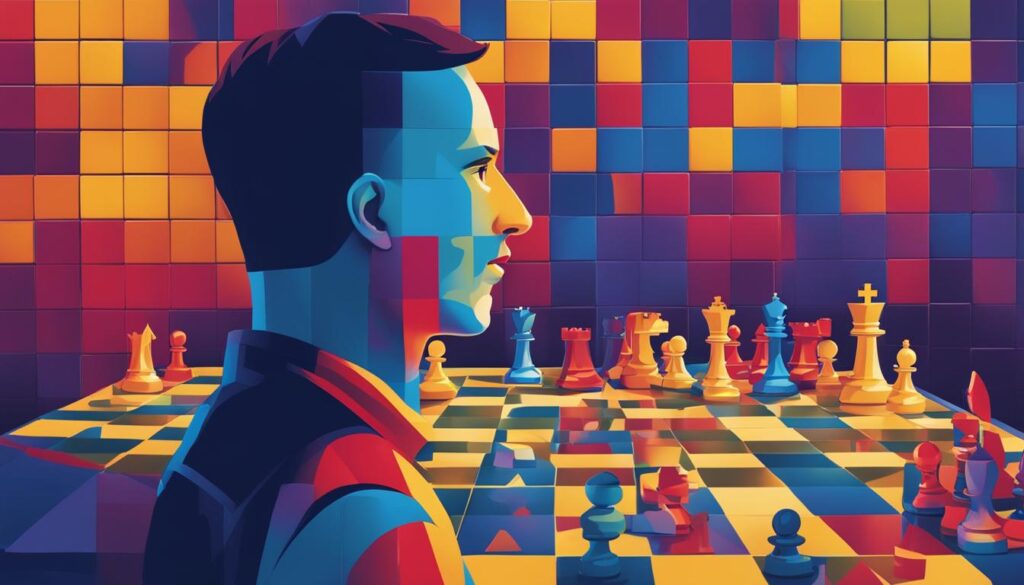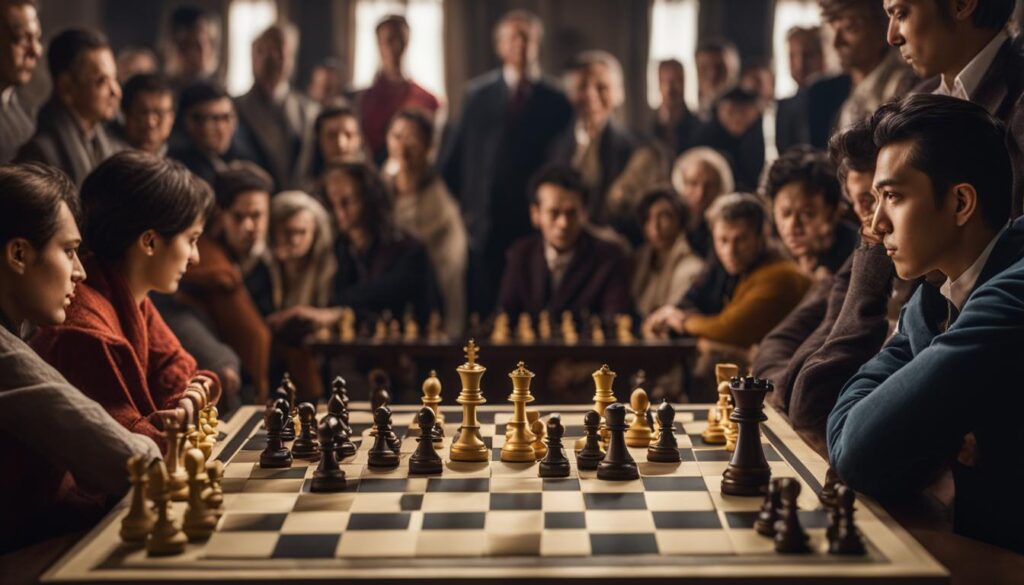We may earn money or products from the companies mentioned in this post.
Chess has been a popular game for centuries, known for its ability to challenge the mind and stimulate critical thinking. However, for individuals with disabilities, traditional chess can be challenging to play. Adaptive chess for disabilities, also known as chess for people with disabilities or inclusive chess, offers a solution by modifying the game to make it accessible to everyone.
Adaptive chess is not just a game; it is a tool for empowering individuals with disabilities and promoting inclusivity. By adapting chess to meet different abilities, individuals with disabilities can now enjoy the benefits of playing and engaging their minds.
Key Takeaways:
- Adaptive chess offers a solution for making the game accessible to individuals with disabilities.
- Chess is a tool for empowering individuals with disabilities and promoting inclusivity.
- Adaptive chess provides cognitive stimulation and challenges the mind.
- Chess can be modified to cater to different abilities, including physical and cognitive disabilities.
- Creating an inclusive environment through adaptive chess programs and initiatives is crucial for promoting accessibility and empowering individuals with disabilities.
Engaging the Mind with Adaptive Chess
Adaptive chess for disabilities provides a unique opportunity for individuals with special needs or those who are differently abled to engage their minds and improve cognitive abilities. Chess is an excellent game for individuals with disabilities as it promotes analytical and strategic thinking while also providing an opportunity for socialization.
Playing chess requires a great deal of concentration, memory, and problem-solving skill. These are all cognitive abilities that individuals with disabilities can greatly benefit from. Additionally, playing chess can be a fun and engaging way to improve these skills.
Chess for special needs individuals is particularly beneficial as it can help to improve socialization skills. Playing chess in a group provides a shared interest and common ground for players to interact. This can be especially important for individuals with disabilities who may find it difficult to connect with others.
Adaptive chess for differently-abled individuals is also an excellent way to promote creativity and imagination. Chess requires logical thinking, but it also requires creativity in determining the best moves and strategies. This can be an exciting and challenging experience for differently-abled individuals.
The Benefits of Adaptive Chess for Disabilities
The benefits of adaptive chess for disabilities are numerous. Some of the key benefits include:
- Improved cognitive skills
- Increased concentration and memory
- Opportunities for socialization
- Promotes creativity and imagination
- Provides a fun and engaging activity
Overall, adaptive chess for disabilities is an excellent way to engage the mind and provide cognitive stimulation for individuals with disabilities. It is an inclusive game that can be enjoyed by people of all abilities, making it an excellent choice for special needs individuals or those who are differently abled.
Making Chess Accessible for All Abilities
Chess is a game that has been enjoyed by people of all ages and backgrounds for centuries. However, traditional chess sets and rules can be challenging for individuals with disabilities.
To make chess accessible for individuals with disabilities, adaptations and modifications have been made to the game. These adaptations have made the game more inclusive and have allowed individuals with disabilities to participate in the game.
Accessible Chess
Accessible chess refers to the adaptations made to the game to make it playable for individuals with disabilities. These adaptations can include modifications to the chessboard, pieces, and rules.
Some of the modifications made to the chessboard include enlarging the squares and pieces, adding tactile markers to the board, and using contrasting colors to make it easier to distinguish between pieces.
Chess pieces can also be modified to make them more accessible. For example, they can be equipped with velcro strips, making them easier to grip and move. Pieces can also be replaced with larger or more distinguishable objects, such as toy animals or shapes, for individuals with more significant visual or cognitive disabilities.
Chess for Individuals with Disabilities
Chess can be adapted to meet the needs of individuals with various disabilities, including physical and cognitive disabilities. These modifications can make it possible for individuals with disabilities to improve their cognitive skills, social interaction, and confidence.
For individuals with visual disabilities, modifications to the board and pieces can make the game more accessible. Braille chess sets are also available, allowing individuals with visual impairments to play chess using touch.
Individuals with physical disabilities can also participate in the game with modifications such as modified chess tables and pieces that can be moved by hand, mouth, or foot.
Chess has also been used to improve the cognitive skills of individuals with cognitive disabilities, including autism, ADHD, and Down syndrome. Chess can improve memory, concentration, and problem-solving abilities, as well as promote social interaction and confidence.
In conclusion, accessible chess has made it possible for individuals with disabilities to enjoy and benefit from this engaging and stimulating game. The modifications and adaptations made to chess have made it more inclusive, allowing individuals with disabilities to participate in this game and reap its benefits.
Chess for Physical Disabilities
Adaptive chess has proven to be an excellent tool for individuals with physical disabilities to engage in the game. Inclusive chess programs and initiatives have made it possible for disabled children to develop their motor skills, hand-eye coordination, and strategic thinking. Adaptive chess offers a range of modifications and accommodations that enable people with physical limitations to participate fully and enjoy the game.
Techniques and Accommodations
Chess pieces can be modified to make them easier to grasp and move, catering to different physical abilities. For example, pieces can be larger, heavier, or have a better grip. Some chessboards are cushioned, providing a soft surface that absorbs shocks and vibrations. This can be particularly helpful for people with cerebral palsy or other conditions that affect body movement.
Other adaptations include the use of devices that enable players to move the pieces without using their hands. For instance, voice-controlled devices or foot pedals can be used to manipulate the pieces, making the game more accessible for those with limited hand or arm function. Some chessboards have been designed to be played lying down, allowing individuals who cannot sit to play the game comfortably.
Benefits of Adaptive Chess for Disabled Children
Chess can help children with disabilities improve their cognitive and social skills, as well as boost their confidence. By playing adaptive chess, children can develop their problem-solving abilities, memory, and concentration. Inclusive chess programs also provide opportunities for disabled children to socialize with their peers, building friendships and reducing feelings of isolation.
Playing adaptive chess can also be a beneficial therapy for children with physical disabilities. It engages their minds and can be a distraction from the challenges of their condition. Through chess, children can learn to focus on their abilities rather than their limitations.
Overall, adaptive chess has proven to be an excellent tool for empowering people with physical disabilities. With the right accommodations, chess can be made accessible for all abilities, providing cognitive stimulation and the opportunity for individuals to engage fully and enjoy the game.
Chess for Cognitive Disabilities
Individuals with cognitive disabilities benefit greatly from playing adaptive chess. The game provides cognitive stimulation that helps develop and improve cognitive skills, memory, concentration, and problem-solving abilities. Adaptive chess can be particularly beneficial for disabled children.
Studies have shown that chess can enhance executive functioning, which includes processes such as planning, attention, decision making, and self-control. This cognitive boost can have a positive impact on overall academic and social performance.
“Playing chess helps me with my memory and planning skills. I get excited when I win and feel motivated to keep playing and improving.”
Adaptations in chess can make the game more accessible for individuals with cognitive disabilities. For example, larger and bolder chess pieces can be used to improve visibility and recognition. In addition, chess clocks can be modified to make them easier to use and understand.
| Adaptations in Adaptive Chess for Cognitive Disabilities | Explanation |
|---|---|
| Larger Pieces | Improves visibility and recognition |
| Bolder Pieces | Enhances contrast and visual perception |
| Modified Chess Clocks | Makes them easier to use and understand |
Adaptive chess can also be used as a tool for therapy and rehabilitation for individuals with cognitive disabilities. By playing the game, individuals can improve their social skills, boost their self-esteem, and develop a sense of accomplishment and empowerment.
Adaptive chess for cognitive disabilities is one of the many ways that chess can be made inclusive and accessible for all abilities. By promoting adaptive chess programs, individuals with cognitive disabilities can benefit from the cognitive stimulation and social opportunities that the game has to offer.
Promoting Inclusivity with Chess
Adaptive chess is not only a game, but it is also an opportunity to promote inclusivity and understanding among individuals with different abilities. Chess for people with disabilities is an inclusive activity that provides a great way to bring people together regardless of their physical or cognitive capabilities.
The game of chess is a universal language that everyone can learn, play, and enjoy. Initiatives that promote inclusive chess are essential in creating a welcoming environment for individuals with disabilities. Such programs and initiatives foster a sense of community among people with different abilities.
Additionally, the promotion of inclusive chess can help remove the stigma surrounding disabilities, resulting in more significant acceptance and awareness. When people realize that individuals with disabilities can play chess and excel in it, they start to understand that anyone with a disability can achieve great things.
Playing inclusive chess helps individuals with disabilities develop their skills, confidence, and self-esteem. They realize they have the same opportunities as anyone else. Chess is a great equalizer, and this game provides a unique opportunity for people with disabilities to compete on an equal footing with their non-disabled peers.
Furthermore, promoting inclusive chess provides a platform for individuals with disabilities to showcase their abilities and talents. It also encourages others to recognize the capabilities of individuals with disabilities and to view them as valuable members of society.
In conclusion, adaptive chess is more than a game; it is an opportunity to promote inclusivity and understanding. Chess for people with disabilities is an excellent way to bring people together and foster a sense of community among individuals with different abilities. The promotion of inclusive chess is crucial in removing the stigma surrounding disabilities and creating a welcoming environment for all chess players.
Conclusion
Adaptive chess for disabilities is a powerful tool for unlocking the minds of individuals with varying abilities. Its inclusivity and accessibility make it a game for everyone, regardless of physical or cognitive limitations.
The benefits of adaptive chess are numerous, from providing cognitive stimulation and improving memory and concentration to promoting problem-solving and critical thinking skills.
By making chess accessible for all abilities, we create an environment that celebrates diversity and promotes inclusivity. Initiatives and programs focused on adaptive chess have a positive impact on individuals with disabilities, allowing them to engage in this intellectual pursuit and expand their minds.
In conclusion, adaptive chess for disabilities is not just a game; it’s a way of empowering individuals and creating an inclusive and welcoming community.
FAQ
What is adaptive chess for disabilities?
Adaptive chess for disabilities refers to the modifications and accommodations made to the game of chess to make it accessible for individuals with disabilities. It includes adaptations for physical and cognitive disabilities, enabling people of all abilities to engage in the game.
How does adaptive chess engage the mind?
Adaptive chess engages the mind by providing cognitive stimulation and promoting critical thinking skills. It requires players to strategize, analyze positions, and make decisions, which helps improve memory, concentration, and problem-solving abilities.
How is chess made accessible for individuals with disabilities?
Chess is made accessible for individuals with disabilities through various adaptations and modifications. These may include using specialized chess boards, pieces, or assistive technologies. Additionally, alternative playing methods or rule adjustments can be implemented to accommodate different abilities.
How does adaptive chess cater to physical disabilities?
Adaptive chess caters to individuals with physical disabilities by providing accommodations that enable them to participate in the game. This can include using adapted boards with larger squares or tactile features, allowing players to make moves with alternative methods, or using assistive devices to manipulate the chess pieces.
What are the benefits of adaptive chess for cognitive disabilities?
Adaptive chess offers numerous benefits for individuals with cognitive disabilities. It can improve cognitive skills such as memory, concentration, logical reasoning, and decision-making. The game provides a structured and engaging activity that promotes mental stimulation and development.
Why is promoting inclusivity with chess important?
Promoting inclusivity with chess is important because it creates a welcoming environment for individuals with disabilities. Inclusive chess programs and initiatives allow everyone to participate and benefit from the game, fostering social interaction, skill development, and empowerment among individuals with disabilities.
Affiliate Disclosure: This post may contain affiliate links. If you purchase through our link, we may receive a small commission, but at no additional cost to you. For more information, please see our Disclosure statement.



